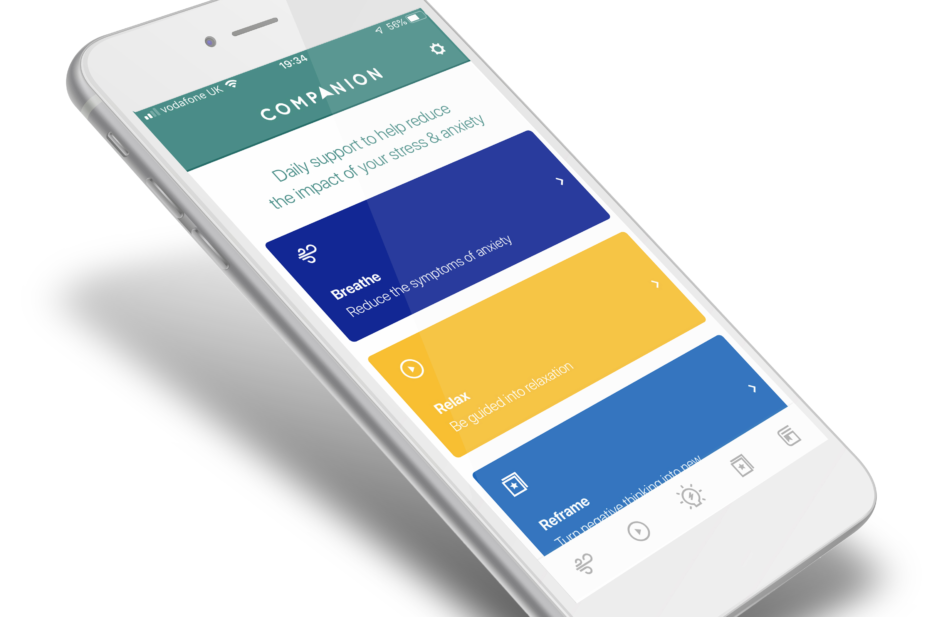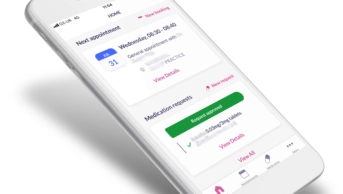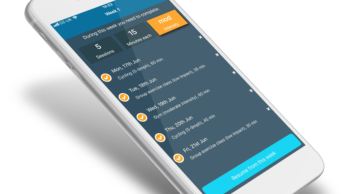
The ‘Stress and Anxiety Companion’ app — created by Dan Bladon and his former psychologist, Robin Hart — uses cognitive behavioural therapy (CBT) to provide users with daily, on-the-go mindfulness and anti-anxiety support and, on the whole, it does a great job.
Using breathing techniques while learning how to reframe negative thoughts will be familiar territory to those who are knowledgeable about CBT. However, for those who are new to this approach to managing stress and anxiety, the software is foolproof, with easy-to-navigate instructions and a simple infrastructure.
Split into three primary functions (‘Breathe’, ‘Relax’ and ‘Reframe’), the free version of the app provides a solid basis for anyone wishing to dabble in CBT. This version provides one breathing exercise (‘Rebreathing’), which aims to rebalance oxygen and carbon dioxide levels to aid relaxation, and two recordings (‘Mindfulness Body Scan’ and ‘Progressive Muscle Relaxation’), which are designed to centre, focus and relax the user, as well as identify and release muscle tension, respectively.
There is a ‘scenario-specific relaxation’ function available under the Relax section, although this is reserved for subscribers (who, for £1.99 per month, can access several additional features across the app). This offers recorded examples and guidance for common challenges and events that might cause stress and anxiety. Work presentations, study-related anxiety and travel-related anxiety are the first three examples given, and these offer more regular users the chance to personalise their therapy. Given that this is behind a paywall, however, it’s a shame there isn’t a free trial period for new users to test before they commit to a subscription.
The third function invites users to recognise and “reframe” their negative thinking. It does this first by asking the user to log their current anxiety level, followed by inviting the user to type out their perceived trigger of their raised anxiety. The app then asks the user to categorise their negative thought, before asking ‘What new thought could you use instead?,’ thereby introducing a “reframed” thought. By the end of the exercise, the user should be training their brain to approach their own negative thoughts differently and to find a solution for themselves before they get worked up into a state of stress or panic.
The additional ‘Learn’ section of the app would be especially helpful for those newly diagnosed with stress and/or anxiety. Here, “essential information” is provided about anxiety and CBT as a process. At times, the simplicity of the language used can come across as mildly patronising (which is a common theme across the app) but, generally, each section header — including ’What causes anxiety’ and ‘Managing anxiety with CBT’, and sections on both exercise and diet and anxiety — provides such a helpful overview that the tone is easily forgiven.
Bladon aptly describes the app as a “Swiss Army knife for anxiety and negative thinking”. The Stress and Anxiety Companion app is an easy-to-use, effective tool, both for people who are new to CBT and those who need extra support to continue CBT habits. The offering for free users is limited, but the app offers great value all the same.
The ‘Stress and Anxiety Companion’ app is available on iPhones at the App Store and Android devices at Google Play.
References
Companion Apps Limited. Stress and Anxiety Companion. 2019. Available at the App Store and Google Play


